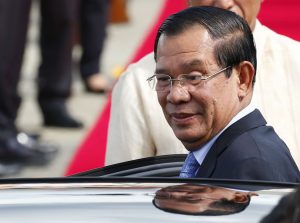Cambodia’s opposition movement seeks US help amid crackdown

WASHINGTON (AP) — Cambodia’s leader is destroying a political opposition movement that threatens his three-decade grip on power and he’s accusing America of plotting his downfall. An influential opposition figure is in Washington is wondering if she’ll get any help at all.
Prime Minister Hun Sen talks about nefarious U.S. designs to unseat him, but the United States rejects that claim as baseless. Experts say his attacks are driven by a fear of losing elections next year.
Opposition leader Kem Sokha is imprisoned and his party seems likely to be dissolved this week by Cambodia’s highest court. His daughter, a spokeswoman for the Cambodia National Rescue Party, is urging President Donald Trump’s administration to act quickly and try to salvage democracy in the Southeast Asian nation.
“Hun Sen thinks the world is not paying attention and that nobody is prepared to do anything about it,” said Monovithya Kem, who wants the United States to impose sanctions on Cambodian officials complicit in the crackdown.
Monovithya said about 20 lawmakers, out of the party’s 55 in the 123-member National Assembly, have fled Cambodia since Kem Sokha was arrested Sept. 3 and charged with treason, which carries a sentence of up to 30 years in prison. Monovithya and her sister also fled, fearing arrest. The government accuses them of conspiring with the CIA.
It’s not unusual for Cambodian politicians to demonize the U.S. There’s fertile history to draw on.
U.S. secret bombing during the Vietnam War is often blamed for the rise of the Khmer Rouge, whose late 1970s genocidal rule killed one-quarter of the Cambodian population. After a Vietnamese invasion toppled the Khmer Rouge, the U.S. voted for a coalition including the former rulers to retain Cambodia’s U.N. seat instead of giving it to the Vietnam-backed government.
Since Cambodia emerged from civil war in the 1990s, however, the U.S. has been a more benign presence. Since 1991, it has provided $1.8 billion in aid for development and democracy promotion and $60 million in military assistance, U.S. government data show. Hun Sen’s eldest son was even educated at West Point.
But in recent years, the Cambodian leader’s relationship with Washington has become increasingly acrimonious. In that time, Cambodia’s reliance on nearby China, which avoids criticizing others’ human rights records, has intensified.
“U.S. influence in Cambodia is at an all-time low,” said John Sifton, Asia advocacy director for Human Rights Watch in Washington.
He said the U.S. retains some power and leverage, particularly through voting rights at the World Bank and Asian Development Bank that provide aid for the impoverished country. America also is a big market for Cambodian textiles. Still, U.S. officials aren’t sure they can change Hun Sen’s calculus.
“Authoritarians don’t give up power easily,” Sifton said. “He still has China. He still has Vietnam. He still has ASEAN members who will stand beside him.” There are 10 members in the Association of Southeast Asian Nations, whose leaders Trump was to meet at a summit in the Philippines.
Through 32 years in power, Hun Sen has mastered how to sideline political opponents. In 1997, he ousted a co-prime minister in a bloody coup. In recent years, he’s used Cambodia’s pliant judicial system.
To avoid international reprisals, he’s often struck last-minute political compromises. He allowed former opposition leader Sam Rainsy to contest the last national elections in 2013 when Hun Sen narrowly retained power in a flawed vote. Rainsy now lives in exile.
As Hun Sen now looks ahead to a July vote, he’s mounting perhaps his biggest assault on Cambodian democracy since the coup. The government filed a lawsuit with the Supreme Court for the opposition party to be dissolved, alleging it conspired to topple his administration. The court is due to rule on Thursday.
Hun Sen said last week he was willing to wager 100-to-1 that the party will be dissolved.
Speaking to The Associated Press, government spokesman Phay Siphan claimed to have evidence proving American agents have conspired with the opposition. The government has previously publicized a video clip showing Kem Sokha giving a speech in which he describes a grass-roots political strategy to challenge Hun Sen, with U.S. support.
U.S. Ambassador William Heidt has dismissed the allegation as “intentionally inaccurate, misleading and baseless.”
Heidt was summoned to Washington this past week for consultations amid calls from U.S. lawmakers for visa bans and possible financial sanctions on Cambodian officials involved in the crackdown. It’s a course supported by Human Rights Watch and other activists.
Cambodia’s government also has targeted civil society and media, shuttering radio stations with programming from U.S.-funded Radio Free Asia and Voice of America. The National Democratic Institute, which helped train political parties and election monitors, was kicked out of the country.
Convicting Kem Sokha and dissolving his party would set back the relationship between Washington and Phnom Penh further. But it’s unclear whether that would be the step leading to American sanctions.
The fence-sitting frustrates Monovithya Kem as she lobbies for U.S. action now, not after a court ruling that dismantles the opposition.
If the party is dissolved, she said, “there is absolutely no way the elections next year will be free and fair.”
___
Associated Press writer Sopheng Cheang in Phnom Penh, Cambodia, contributed to this report.

